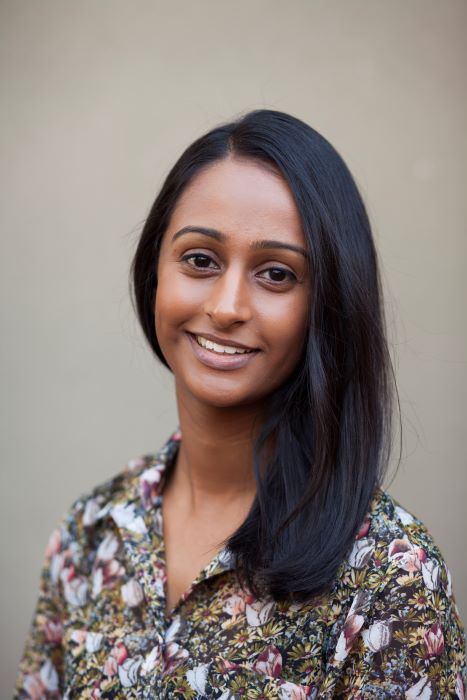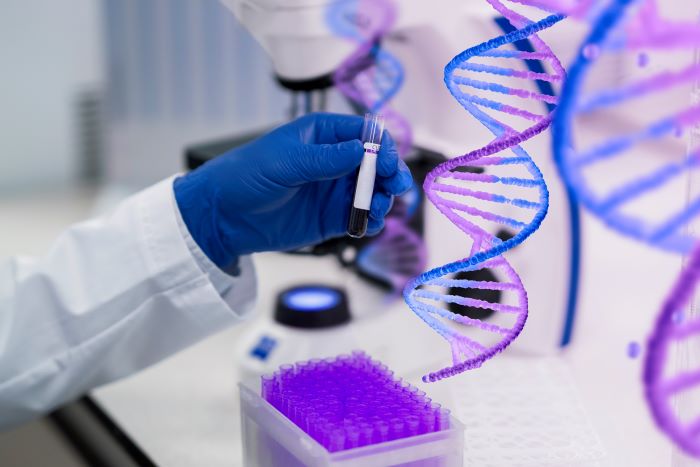RADHA RAMANAN
Dr Radha Ramanan is the current Australian Haemophilia Centre Directors’ Organisation (AHCDO) Research Fellow.
Dr Radha Ramanan received the AHCDO John Lloyd Clinical Excellence Grant in 2022 for her research project titled Phenotypic characterisation and molecular profiling of congenital fibrinogen disorders: the Australian experience. This is an update on her project.
Dr Radha Ramanan

Dr Radha Ramanan
Fibrinogen acts as an important clotting factor required for adequate blood clotting and wound healing. Currently, 160-170 patients with a congenital fibrinogen disorder nationwide are included on the Australian Bleeding Disorders Registry (ABDR).
These patients have varying symptoms from their fibrinogen disorder: some patients have a bleeding problem, others develop blood clots (thrombosis) and many patients have no issues related to the fibrinogen at all. This project involves collecting data on the clinical manifestations of patients with a congenital fibrinogen disorder identified through the ABDR, including bleeding episodes, thrombotic episodes and outcomes in the surgical and obstetric settings.
Additionally, genetic testing will be performed in these patients. Recurrent mutations in the FGA, FGB and FGG genes (these are the genes which encode for the fibrinogen protein) have been well-described internationally, however genetic testing of the Australian population of this cohort has not been performed to date. We aim to not only assess the FGA, FGB and FGG genes in this cohort, but also to examine approximately 90 other genes to identify if there may be other genetic ‘modifiers’ that may explain some of the variation in this cohort, for example, co-existing thrombosis-predisposing mutations that may be present in congenital fibrinogen disorder patients with a thrombotic phenotype.

We are also collecting blood samples that are being stored for future laboratory studies investigating the structure and function of the abnormal fibrinogen protein.
We will also analyse the treatment approaches used in patients with a congenital fibrinogen disorder in the acute bleeding, peri-operative and obstetric settings, and anticoagulation (ie blood thinning) approaches used in those patients presenting with thrombosis. Robust evidence-based guidelines for management of these patients are lacking, and typically plasma-derived replacement (eg fresh frozen plasma, cryoprecipitate, fibrinogen concentrate) is used with varying success. We aim to assess outcomes associated with the various treatment modalities to inform national guidelines for management in this complex group of patients.
We have presented some of the preliminary clinical data of the Alfred Health patients with a congenital fibrinogen disorder at the Australian Blood conference in 2022. The Alfred Health cohort constitutes 26% (44/167) of all Australian patients with a congenital fibrinogen disorder:
<5 afibrinogenemia
16 hypofibrinogenemia
25 dysfibrinogenemia
<5 hypodysfibrinogenemia
<5 not classified.
At presentation, the research study patients with a congenital fibrinogen disorder were diagnosed by:
30% (13/44) from an incidentally discovered low fibrinogen
20% (9/44) from familial screening due to an affected family member
41% (18/44) due to a bleeding event
<5 due to a thrombotic event
<5 through circumstances that were not specified.
Prior to diagnosis:
53 procedures were recorded: of these 19% (10/53) were major and 81% (43/53) were minor procedures. Plasma-derived fibrinogen concentrate (RiaSTAP®) was used in 42% (22/53). Peri-operative outcome data was available for 27/53 procedures: of these greater-than-expected bleeding occurred in 19% (5/27) and thrombosis in <5/27.
So far we have prospectively collected blood samples on 20 patients with a congenital fibrinogen disorder across Australia, to pair with the clinical data described above. The aim is to collect at least 50 patients in total. We hope to finish recruiting patients and collecting data by the end of 2024.
Dr Radha Ramanan is the current Australian Haemophilia Centre Directors’ Organisation (AHCDO) Research Fellow. Radha is also a Haematology Fellow at Alfred Health in Melbourne and is undertaking a PhD at Monash University, having completed her advanced training in clinical and laboratory haematology in 2021 at Alfred Health. She has an interest in bleeding disorders and molecular pathology and seeks to broaden our understanding of these fields through research funded by AHCDO.
Haemophilia Foundation Australia acknowledges the Traditional Owners and Custodians of Country throughout Australia, the land, waters and community where we walk, live, meet and work. We pay our respects to Elders past and present and extend that respect to all Aboriginal and Torres Strait Islander peoples.
Sign up for the latest news, events and our free National Haemophilia magazine